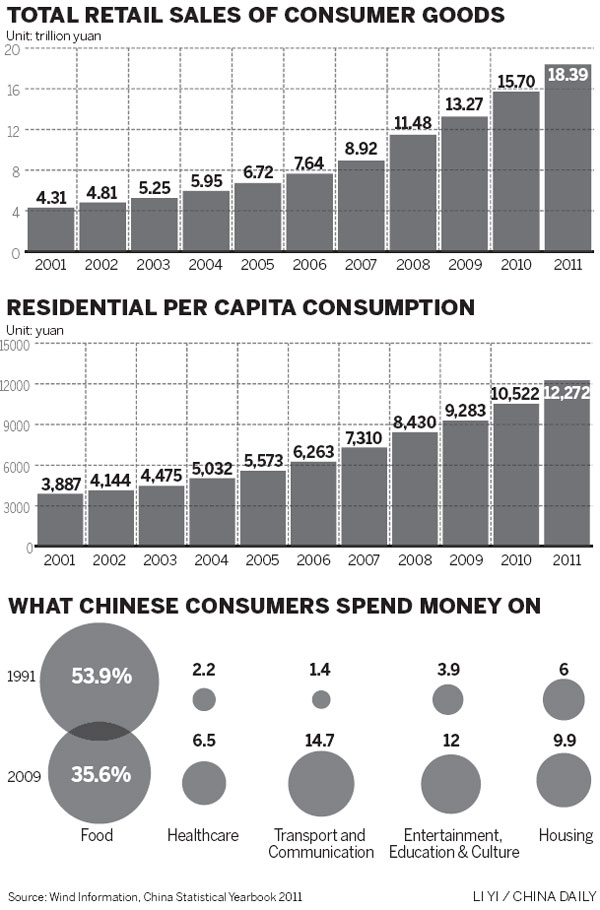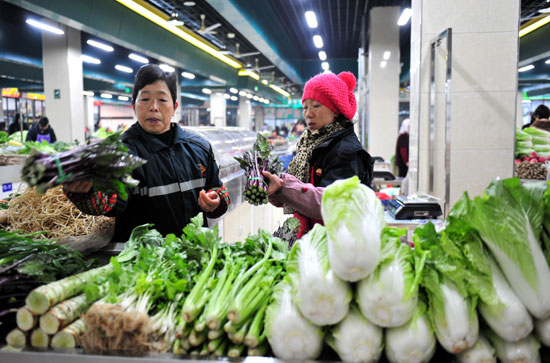Serving up Chinese consumers
Updated: 2013-01-04 02:06
By Wei Tian (China Daily)
|
||||||||
Spending on services set to be a major driver of long-term and sound economic growth, reports Wei Tian
The service sector is likely to be the next big driver of domestic consumption in China, helping to bring about long-term and sound economic expansion, experts said.
By 2012, consumption was already contributing more to the growth of China's gross domestic product than investment, a result in part of low inflation, an increase in disposable incomes and the support provided by a series of government policies.
Data from the National Bureau of Statistics suggest that consumption contributed 4.2 percentage points to the 7.7 percent GDP growth the country achieved in the first three quarters of 2012.
The rate of increase for retail sales of consumer goods went from 18.1 percent at the end of 2011 to 13.2 percent in August 2012. Yet the year-on-year growth rate of per capita consumption increased 9.8 percent in the first quarter of 2012, from the 8.5 percent average seen since 2003 and it was the highest record since the outbreak of the global financial crisis in 2008.
Xu Qiyuan, a researcher with the Chinese Academy of Social Sciences, said:"This is a sign that consumers are spending much more in the service sector."
Lu Zhengwei, chief economist with Industrial Bank Co Ltd, said service consumption will give a further boost to urbanization, which the country's new leadership has said is one of its main tasks.
"Vice-premier Li Keqiang stressed the importance of transforming migrant workers into urban inhabitants, instead of simply adding up the size and population of cities.
"Ensuring migrant workers receive the same treatment as urban citizens will place a large demand on the service industry. That is what Li said will help create jobs and stimulate domestic demand."
Lu was echoed by Ye Tan, a financial commentator, who said a lot of domestic consumption will be of services.
Even so, she said China's consumption structure is still unbalanced, as the rich continue to spend lavishly while the middle class' purchasing power remains frail.
Two other sources of concern are middle-aged and senior citizens, whose spending power has been reduced amid concerns over the future of social services. Ye said improving the social security system is the best way to increase that power.
A recent survey by the marketing research company ACNeilson suggests that consumer confidence stabilized in China in the third quarter. Middle-class consumers in the largest cities, buoyed by a low consumer price index and measures to stimulate consumption, were much more willing to spend in the third quarter than in the previous one.


 Li Na on Time cover, makes influential 100 list
Li Na on Time cover, makes influential 100 list
 FBI releases photos of 2 Boston bombings suspects
FBI releases photos of 2 Boston bombings suspects
 World's wackiest hairstyles
World's wackiest hairstyles
 Sandstorms strike Northwest China
Sandstorms strike Northwest China
 Never-seen photos of Madonna on display
Never-seen photos of Madonna on display
 H7N9 outbreak linked to waterfowl migration
H7N9 outbreak linked to waterfowl migration
 Dozens feared dead in Texas plant blast
Dozens feared dead in Texas plant blast
 Venezuelan court rules out manual votes counting
Venezuelan court rules out manual votes counting
Most Viewed
Editor's Picks

|

|

|

|

|

|
Today's Top News
Boston bombing suspect reported cornered on boat
7.0-magnitude quake hits Sichuan
Cross-talk artist helps to spread the word
'Green' awareness levels drop in Beijing
Palace Museum spruces up
First couple on Time's list of most influential
H7N9 flu transmission studied
Trading channels 'need to broaden'
US Weekly

|

|









